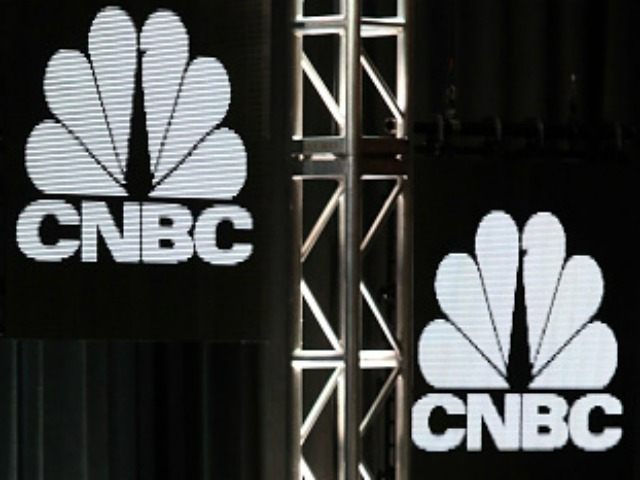Wednesday night’s CNBC Republican debate will be moderated by Carl Quintanilla, Becky Quick, and John Harwood.
What perspective do these moderators bring to the presidential contest?
Free Trade
The Trans-Pacific Partnership free-trade deal scrambles most partisan calculations. President Obama strongly desires the deal, but is relying largely on Republican help to get it passed. Democrats largely oppose it, in part because their powerful labor union constituency hates it. Hillary Clinton’s position on the TPP is one of the most epic flip-flops in American history. She was a strong supporter of the trade bill, repeatedly referring to it as the “gold standard” for such agreements and often taking credit for helping to negotiate it… until she suddenly reversed herself and declared her opposition, in the face of a growing challenge from the Left by Bernie Sanders, and the angry demands of Big Labor.
Some Republicans oppose this particular trade deal because they think it grants the President too much power. Some of the Democrats and Republicans opposed to the deal believe its free-trade provisions could be harmful to the fragile U.S. economy, especially in the area of wage growth, while supporters of the bill believe it would provide a potent economic stimulus.
In early October, questioner Quick described herself as strongly supportive of free trade — agreeing with co-host Joe Kernen on CNBC’s Squawk Box that it was imperative to “have the free flow of trades, get rid of tariffs, get rid of taxes, let it happen” — and talked about the political difficulty the TPP posed for Clinton. “This is Hillary Clinton who as Secretary of State made some huge inroads into this is now faced with a very difficult decision, whether she stands by it or steps down,” said Quick.
A few weeks later, after Clinton came out against the Trans-Pacific Partnership, Harwood came down hard on the former Secretary of State. He derided her opposition to the TPP as “just an act,” a “campaign thing” that did not reflect her real views on free trade. At the time, Vice President Joe Biden’s potential entry into the 2016 Democrat primary made the TPP an especially hot topic, as Biden would surely have supported his boss, remained supportive of the deal, and clashed with Hillary’s opposition.
Squawk Box host Joe Kernen figures prominently in this conversation as well, suggesting that the Obama White House probably isn’t upset by Clinton staking out a meaningless rhetorical position against its trade bill for political reasons.
Experience Vs. Energy
Harwood and Quick have done their part to help the Democrats reverse the age vs. youth narrative of the last two elections. Previous campaigns pitted the younger Obama against Senator John McCain and Mitt Romney, so the media eagerly presented youth and energy as tremendous assets, while deriding the benefits of age and experience. The same playbook was used when Hillary Clinton’s husband ran against the venerable Bob Dole in 1996.
On the other hand, the 2016 election may well pit Hillary Clinton against a much younger Republican, so suddenly — like a car slewing through a hairpin turn in an action film — the media has decided age and experience are the paramount presidential assets, while youth is handicap, especially in the case of a certain Republican from Florida who looks even younger than he actually is. The media is especially eager to instruct Republicans that negative mentions of Clinton’s age and health – the way Democrats mocked Senator McCain during Obama’s first presidential run, and Dole during Bill Clinton’s re-election campaign – are strictly forbidden.
Here’s Quick musing in May that Marco Rubio’s emphasis on his youth and energy might not “play well” for him, and might in fact “tick off” many voters.” Harwood jumps in by speculating that if “you put Marco Rubio up on a debate stage with Hillary Clinton, he looks like a schoolboy.”
It is also worth noting that Harwood has attempted to downplay the importance of Hillary Clinton’s email scandal, dismissing the importance of the Top Secret material found on her email server, and suggesting Clinton’s actions should only be considered important if some act of espionage could be traced directly to her exposure of classified material on that insecure server – a standard hitherto unknown to the American legal system.
Taxation and Tax Cuts
Republican candidates taking the stage on Wednesday night should also be aware Harwood is a vigorous supporter of President Obama’s tax-and-spend wealth redistribution policies, in January portraying the President’s enthusiasm for using the tax code to “take income from wealthy Americans who’ve done so well and put it in the pockets of the middle class” as a “turning point in our politics.”
He seems contemptuous of tax cuts, and dismissive of arguments from candidates like Marco Rubio that “raising taxes on people that are successful is not going to make people that are struggling more successful.”
At this point, all consumers of political news should understand that the biases of debate moderators are highly relevant. It doesn’t mean moderators with strong views are incapable of running a good debate, but the networks really ought to make portfolios of their moderators’ political history available for easy public consumption. Candidates, especially Republican candidates, would be well-advised to compile such portfolios before taking the stage.

COMMENTS
Please let us know if you're having issues with commenting.